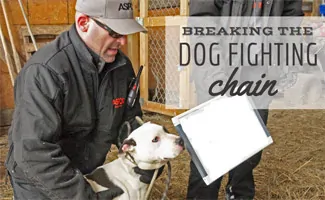When you purchase through links on our site, we may earn a commission. Here’s how it works.
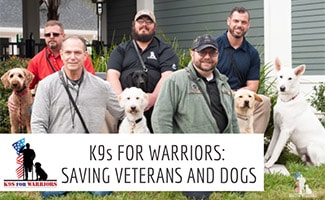
K9s For Warriors’ motto is “we rescue the dog, and the dog rescues the veteran (from severe PTSD and suicide).” We got the chance to chat with Greg Wells, Manager of Programs, about all the incredible work they are doing.
How did the organization go from an idea to reality?
When Shari Duval saw Post Traumatic Stress Disorder (PTSD) symptoms in her son, Brett, a civilian K9 police bomb dog handler who served in Iraq, she found a new mission in life. She put all her time and resources into helping restore the life of her son, and the lives of all service members and veterans suffering from PTSD, Traumatic Brain Injury (TBI) and Military Sexual Trauma (MST).
After two years of research on canine assistance for PTSD, Shari decided the best way to help deserving warriors was to start a nonprofit organization to train and give Service Dogs to assist them in returning to civilian life with dignity and independence.
Shari took a “boots on the ground” approach, contacting as many potential donors and supporters as possible. Through all that effort, she managed to launch K9s For Warriors, in a house in Ponte Vedra, Florida. As the organization grew and took on more staff and prominent community support, it moved into the generously donated, 9-acre, state-of-the-art headquarters called Camp K9 that opened in the summer of 2015.
What do you look for in potential service dogs?
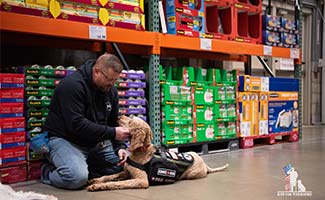
We do not believe one breed is better than another. We look at almost all breeds as long as they meet these standards.
What’s the difference between Service, Therapy & Emotional Support Dogs?
A Service Dog is legally defined as a dog that has been individually trained to perform a task(s) that mitigates the symptoms of the handler’s disabilities. Because of this advanced training, Service Dogs are protected under the Americans with Disabilities Act (ADA) and are granted access to the vast majority of public settings with their handler. Service Dogs provide a range of services from mobility assistance, spatial awareness, medical alert and more, depending on the training they receive.
Therapy and emotional support dogs do not have this advanced training and, therefore, are not protected by the ADA.
Learn more about various assistance animals
Who’s eligible for the program?
K9s For Warriors provides Service Dogs to veterans with a diagnosis of PTSD, TBI or MST. This diagnosis must be related to military service (not combat alone). Applications for our program can be found on our website or interested applicants can call us and have an application sent to them.
What’s your training process?
The training process is a 21-day class. 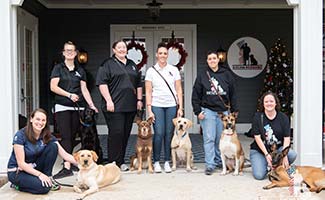
Warriors will be paired with a Service Dog that meets their needs to mitigate their disability. They are also paired with a Warrior Trainer who will teach them the finer points of handling their dog, teach them commands and challenge them along the way with activities such as public access, classroom lectures, basic obedience skills and behavior problem-solving.
At the completion of the 21-day class, each warrior must pass the final Public Access Test to be eligible to graduate and return home with their assigned Service Dog.
Do most of your Warriors live in a specific area?
To date, we have paired warriors with dogs in 47 out of 50 States, Puerto Rico, Guam, Germany and the United Kingdom.
We believe to properly pair a dog with a warrior we must get to know the warrior and their needs. Our application process gives us a lot of information for pairing. We also glean information from several virtual warrior interviews, phone calls and in-person interviews. We use this information to determine the best pairings based on the dog’s behavior, training and temperament, and the warrior’s lifestyle and personality.
Does the program have a long-lasting impact?
Yes, we absolutely find that they make a long-lasting impact on our warriors. Our suicide prevention success rate is 99%, and the majority of our warriors stay active and in touch with us, sending us all kinds of success stories about their new lives with their Service Dogs. We also get many messages of thanks from warriors’ family members – mothers, spouses and children – thanking us for giving them their son/daughter, husband/wife, and parent back.
Can you share a success story?
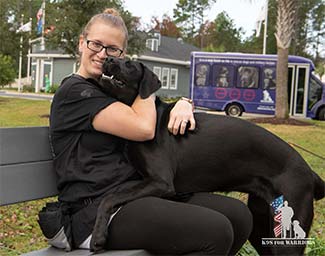
What is the organization’s biggest challenge?
Currently, our biggest challenge is finding dogs in animal shelters that qualify for our program. We have expanded our reach by creating a satellite location in San Antonio, TX, to increase the number of dogs we can evaluate and take into the program. We are also in the process of building a mega kennel near Jacksonville, FL, which will increase the number of dogs we can house and train for our program from about 70 to 270 dogs.
Find Ways To Support K9 Warriors
How has COVID-19 impacted your efforts?
COVID-19 tried to stop us, but our mission of saving lives can’t be stopped. In following federal, state and local guidelines, we have adopted several policies to ensure the safety of our warriors, dogs and staff.
We have altered our training locations to less populated areas, limiting possible exposure but still allowing us to complete public access training. The standard for dog and warrior training hasn’t changed. We’ve adopted new ways of getting extra training time, dog enrichment time and warrior training time to ensure each warrior and dog pair meet or exceed the standard.
We provide face coverings and require them to be worn by all staff and warriors in common areas. During Stay Home measures, all non-essential staff worked remotely while essential kennel staff came to work every day to care for the dogs who depend on us for their livelihood.
Our campus has been completely sanitized and we practice social distancing. In keeping with these guidelines, we require warriors to be screened for symptoms of COVID-19 prior to being accepted into our training class.
What is the biggest need for K9s For Warriors and how can people help?
K9s’ biggest need is directly related to our veterans’ biggest need: pairing more veterans with highly trained Service Dogs to beat PTSD and suicide. The mega kennel mentioned earlier is one way to boost our ability to scale up for the veterans who need our program. More Service Dogs available equals more veterans’ lives saved.
To make that happen, as a nonprofit, we always need donations. Funds, of course, are paramount, but in-kind gifts for the mega kennel, such as construction, materials, labor and furnishings are also invaluable.
We also have an Amazon wish list for those who may want to buy dog products for our kennels, such as Nylabones, KONG toys, peanut butter, etc. As always, everything helps, no matter how big or small!
Thanks Greg for taking the time to share more about K9 For Warriors. Learn how you can bond with your new dog.
How have you benefited from a service dog? Or have you ever considered getting a support animal?
Tagged With: Adoption